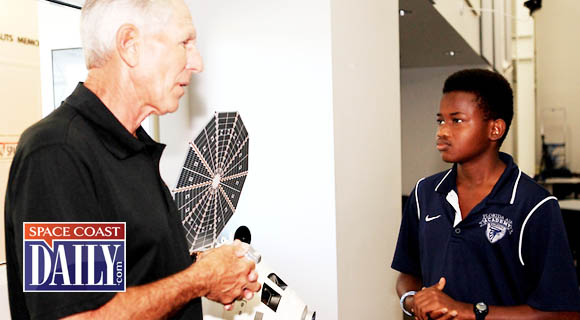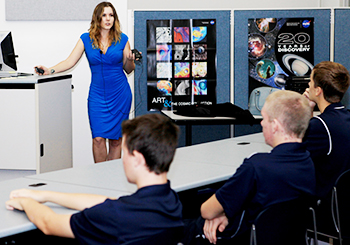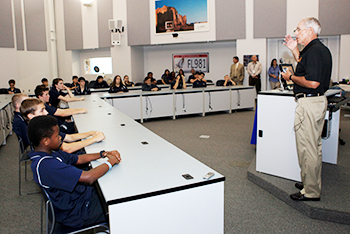Florida Air Academy Student Reaches For Stars
By Bob Granath, NASA's Kennedy Space Center, Florida // November 9, 2014
Gideon Gidori from African nation of Tanzania

Epic Change Awarded Gideon Gidori Scholarship To Attend Florida Air Academy In Melbourne, Florida
BREVARD COUNTY, FLORIDA – For more than a half century, people around the world have been inspired as humans traveled to Earth orbit and the moon. Many young people now dream of becoming space explorers – even in the most remote areas of our planet.
Many students living in the Arusha region of the east African nation of Tanzania do not go beyond primary school. Gideon Gidori was only seven years old when he decided he wanted to become an astronaut.
However, he knew that would require much more education and training. With the help of a village school founder, a Brevard County-based philanthropic organization and a private school, opportunities now are opening for Gidori that would have been unthinkable a few years before.
In the fall of 2009, at age 11, Gidori wrote about his desire to become a space traveler on his Web blog, “Shoot for the stars — Adventures of an aspiring astronaut.”
“I would like to be an astronaut when I grow up and see the moon by my two eyes,” he said. “I will do anything to study hard, or whatever, to achieve my goal.”
Now age 15, Gidori is a student at Florida Air Academy where his classes include pilot’s lessons and an opportunity to hear from experts on spaceflight at NASA’s Kennedy Space Center in Florida.

On Oct. 29, Gidori and his sophomore class of 28 students from Florida Air Academy participated in a program at the NASA Educator Resource Center, operated by the Astronauts Memorial Foundation.
According to Andrea Cann, Education Programs coordinator at the center, the program included a one-hour science workshop in addition to guest speakers who provided insight into some of the career opportunities available at Kennedy.
“Many of the students at Florida Air Academy are foreign nationals with diverse backgrounds,” she said.
“We hope this experience of hearing from our speakers and touring the visitor complex will inspire all of the students to continue to work toward their personal goals.”

One of the guest speakers, Rachel Hardy, a mechanical engineer in Kennedy’s Swamp Works laboratory, explained that she and others are working on ways future astronauts may live off the land as they explore beyond Earth.
“‘Every pound costs thousands of dollars to launch,” said Hardy who earned a degree in mechanical engineering from the University of Louisville.
“If you can make it while you are there, it will save money and you can stay longer.”
The agency’s Lunar Reconnaissance Orbiter and the Lunar Crater Observation and Sensing Satellite have located potential resources just below the moon’s soil.
Hardy and other engineers and scientists are now working on a project called the Regolith Advanced Surface System Operations Robot. RASSOR is a prototype of a mining robot designed to dig and deliver lunar regolith (moon dirt) to a processing plant that would pull oxygen out of the soil or excavate a landing pad for future landers.

Former NASA astronaut Robert Springer related experiences during his two space shuttle missions in 1989 and 1990.
“We did a lot of science up there,” he said. “The science experiments that we did on board the shuttle were in the proof-of-concept stage. It proved we could do the kinds of things we are doing today on the International Space Station.”
A 1964 graduate of the United States Naval Academy and a retired U.S. Marine Corps colonel, Springer stressed the value of education, especially for those considering a career as an astronaut.
“This is rocket science,” he said. “You still have to have as a minimum a Bachelor of Science degree in a technical field – science, technology, engineering or mathematics. Most astronauts have advanced degrees and many have PhDs.”
For Gidori, his dreams began far from modern-day technology.
He grew up in a Tanzanian village near some of Africa’s most famous landscapes and national parks, including the Serengeti and Mount Kilimanjaro.
The village is in a remote location in the northern part of the country near the border with Kenya. While his early education was lacking in resources, it was helped with the assistance of a local woman known as “Mama Lucy.”
 Concerned about the lack of educational opportunities for children in her village, Lucy Kamptoni started a school in 2003 with only six pupils. By selling chickens, she raised money to expand to 120 students.
Concerned about the lack of educational opportunities for children in her village, Lucy Kamptoni started a school in 2003 with only six pupils. By selling chickens, she raised money to expand to 120 students.
In many cases, there was only one textbook available for a class. Students needed to copy class notes and memorize the information.
While Swahili is the primary language in Tanzania, fortunately for Gidori, English also is taught in most of the nation’s schools and both are considered official languages.
These lessons would prove crucial for the aspiring astronaut when an opportunity soon came his way.
In 2007, Kamptoni met volunteers from the Satellite Beach, Florida-based nonprofit organization, Epic Change.
According to the organization’s website, they were successful in helping raise additional funds so that “Mama Lucy’s school now employs over 60 staff and serves more than 600 children on three campuses in Moivaro, Kimandolu and Manyire, Tanzania. Students have access to science and tech lab facilities, libraries, a school farm, boarding facilities and more.”
Epic Change also awarded Gidori a scholarship to cover part of his cost to attend Florida Air Academy in Melbourne, Florida. The academy is a co-educational, college preparatory school for grades 6 through 12. Their students represent more than 20 U.S. states and 23 countries.
The diversity of the Florida Air Academy student body is part of what Gidori likes best.
“I have met with people from different parts of the world with different cultures,” he said. “I have come in contact with students my age, younger and even older who are such good friends.”
Now in his second year at Florida Air Academy, Gidori noted in September of this year that he is enjoying his experience.
“It’s the first couple weeks of school and things are a little challenging, but that’s what school is all about, being challenged,” he said. “I’m totally loving it.”
Gidori’s courses at school now include learning to fly.
“I’ve started to take flight lessons, which are extremely fun,” he said. “I get to fly a plane and get a pilot’s license by the time I graduate.”
With his recent experience at Kennedy and as a student at Florida Air Academy, Gidori now believes his opportunities are boundless.
“It makes me feel free, loved, cared for,” he said. “It makes me see my future already, makes me feel that I can make it anywhere.”















